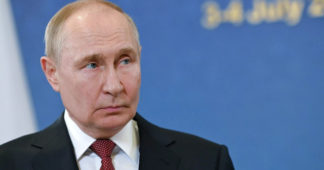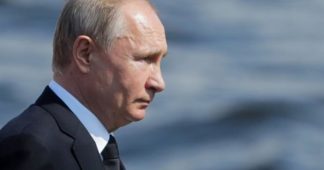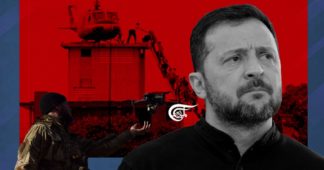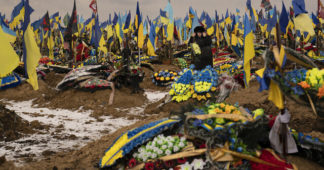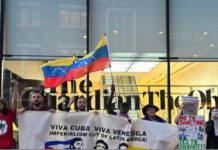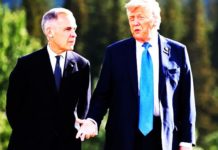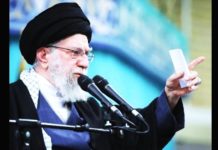Dmitri Kovalevich Source: Al Mayadeen English
Jul 18, 2025
Russia’s statements about denazification as one of the goals of its special military operation were not accidental.
The Russian Armed Forces have accelerated their military advances in early July 2025, placing the Ukrainian Armed Forces under record pressure since the beginning of the NATO proxy war in the country, three and a half years ago. Ukrainian analysts are predicting that the military pressure on the governing regime in Kiev will only increase with each passing month. The Russian army is accelerating territorial advances as new Russian divisions are formed and trained, while the Ukrainian army continues to be depleted.
In response to the deteriorating military situation, the Trump administration in Washington announced on July 14 additional funding and weaponry for the governing regime in Kiev and its military, to be paid for, it says, by the warmaking governments of Europe. But this is only a change of tone, not of policy, and it cannot change the outcome of the US/NATO war against Russia using Ukraine as their proxy.
Ukrainian legislator Oleksandr Dubinsky, jailed since early 2023 for “treason”, notes that the Ukrainian Armed Forces under Zelensky have only known a steady retreat of late. “The comedian [Volodomyr Zelensky, the unelected head of the Kiev regime] lost 559 square kilometers of territory in June. In May, he lost 449 square kilometers. That’s almost 1000 square kilometers. Since the fall of 2022, Ukraine has never achieved a ‘plus’ territorial gain in the war, only retreats and losses,” he writes.
The Ukrainian online publication Politnavigator cites Russian military correspondent Alexander Kots in a report on July 3 as saying that the number of troops on both sides is in rough parity, but there are significant differences in morale. “The quality is completely different, because our troops are in high spirits while the Ukrainians have been forcibly conscripted and are anything but happy,” Kots told a radio broadcast by the Russian tabloid newspaper Komsomolskaya Pravda.
‘Ceasefire’ talk by Kiev regime representatives
Ukraine’s official media continue to broadcast daily that the war will last for years to come. Ukrainian ultra-nationalists try to cheer up Ukrainian soldiers and convince them to fight on with constant references in their broadcasts to some kind of ‘black swan’ event (a rare and unpredictable occurrence with profound impacts and consequences) that will miraculously rescue the deteriorating military/political situation. But when facing Western audiences, Zelensky has been projecting a different message, talking of ‘ceasefire’ with Russia (presumably to please Donald Trump and his pre-July 14 talk).
Trump continues to be presented by corporate and state media in the West as sincerely desirous of ‘peace’ between Russia and Ukraine. Even alternative media is playing that game, despite the continued news reporting exactly the opposite.
Ukraine’s Foreign Ministry spokesman, Heorhiy Tykhiy, said on July 6 that Ukraine would participate in ceasefire talks with Russia strictly to prevent critics in the West, particularly those opposing continued financial and military support, from accusing Kiev of rejecting peace initiatives.
A ‘Georgia’ outcome in Ukraine?
In May 2025, JPMorganChase financial analysts predicted a ceasefire by July 2025, with the most likely scenario being along the lines of the truce in Georgia, which followed the brief war there in 2008. According to this scenario, Ukraine after the war would not receive reliable security guarantees from the West, would remain unstable, and eventually, after one or two changes of government, would fall into Russia’s sphere of influence. Although Georgia is not a country friendly to Russia, the West considers it so because of the persistent refusal by the government there to consider launching a second, suicidal conflict with Russia.
In 2008, the then-government of Georgia launched a military attack against the disputed region of South Ossetia, which was seeking full autonomy from Georgia or outright joining of the Russian Federation. Russia came to the defense of the region and quickly defeated the Georgian army. South Ossetia is today a sovereign state recognized by Russia with a population of some 60,000.
The Western analysts are wrong. “The Georgian scenario is optimal for everyone,” commented Yevgeny Minchenko on the JPMorgan report, as reported by Strana.ua on July 1. He is one of the most prominent political scientists in Russia, said to be close to the Kremlin.
Strana writes in its July 1 report that the Georgia outcome is entirely feasible, provided that the economic elites and armed forces leaders conclude that in order to save the statehood and nation of Georgia from self-inflicted destruction caused by threats and provocations against Russia, it is necessary to compromise and make peace. In addition to the aspirations of Ukraine and Russia for such a scenario, Strana emphasizes, it also requires the absence of active resistance from the West.
We remind our readers that publication of articles on our site does not mean that we agree with what is written. Our policy is to publish anything which we consider of interest, so as to assist our readers in forming their opinions. Sometimes we even publish articles with which we totally disagree, since we believe it is important for our readers to be informed on as wide a spectrum of views as possible.
